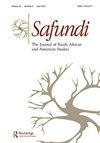独裁者是启发式的:特朗普、祖马,以及比较的危害
IF 0.2
Q4 AREA STUDIES
Safundi-The Journal of South African and American Studies
Pub Date : 2020-10-01
DOI:10.1080/17533171.2020.1832802
引用次数: 0
摘要
本文研究了比较特朗普和祖马的危害,在消极和潜在的积极意义上援引“危险”。关注特朗普经常与(通常是前)第三世界的强人联系在一起——比如在2015年的《每日秀》中,“唐纳德·特朗普:美国第一位非洲总统”——我认为,这种描述的关键价值被它们揭示的关于非洲和全球南方的假设削弱了。但我并没有完全放弃比较特朗普和祖马的关键效用。相反,我主张基于对“共鸣”(松散或短暂的相似性)的理解进行比较,这允许显著的差异,包括这两个角色在全球权力等级中所占据的非常不同的位置。最终,特朗普和祖马最好被理解为对方的启发:有助于解决特定问题的思想人物或学习辅助工具。本文章由计算机程序翻译,如有差异,请以英文原文为准。
The dictator as heuristic: Trump, Zuma, and the hazards of comparison
ABSTRACT This essay investigates the hazards of comparing Trump and Zuma, invoking “hazard” in its negative as well as potentially positive senses. Focusing on the recurrent association of Trump with (often former) strongmen of the erstwhile Third World – as in the Daily Show’s 2015 segment, “Donald Trump: America’s First African President” – I posit that the critical value of such characterizations is undercut by the assumptions they reveal about Africa and the Global South. But I do not entirely discard the critical utility of comparing Trump and Zuma. I argue instead for a comparison rooted in an understanding of “resonance” (as loose or fleeting similarity), which allows for significant difference, including the very different positions these two actors occupy in the global hierarchy of power. Ultimately, Trump and Zuma are best understood as heuristics for the other: figures of thought or learning aids that help in working through a particular problem.
求助全文
通过发布文献求助,成功后即可免费获取论文全文。
去求助
来源期刊
CiteScore
1.00
自引率
0.00%
发文量
0

 求助内容:
求助内容: 应助结果提醒方式:
应助结果提醒方式:


